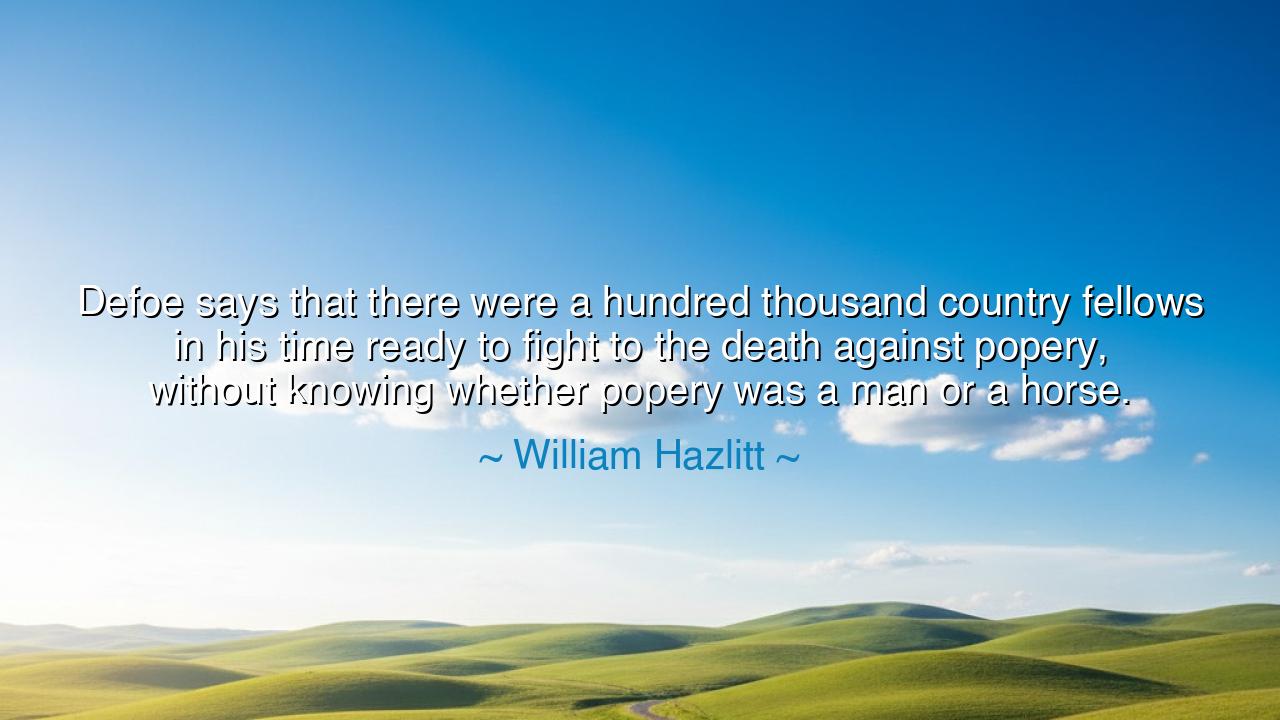
Defoe says that there were a hundred thousand country fellows in
Defoe says that there were a hundred thousand country fellows in his time ready to fight to the death against popery, without knowing whether popery was a man or a horse.






The words of William Hazlitt, when he writes, “Defoe says that there were a hundred thousand country fellows in his time ready to fight to the death against popery, without knowing whether popery was a man or a horse,” cut deep into the frailty of human understanding. Beneath his sharp wit lies a lament that stretches through the ages: that ignorance armed with conviction is more dangerous than evil armed with cunning. Hazlitt speaks not merely of an age gone by, but of every era in which men take up causes they do not comprehend, moved not by reason but by the fever of the crowd.
To understand this saying, one must first recall the world of Daniel Defoe, the author of Robinson Crusoe and a man of keen political insight. In his day, the soil of England was steeped in the struggle between Protestantism and “popery” — the pejorative term for Catholicism, despised by many for reasons more cultural than spiritual. Hatred spread like wildfire among the unlearned, and men, stirred by rumor and fear, stood ready to kill or die for a cause they could not define. Defoe, observing this madness, mocked it with his biting humor — and Hazlitt, writing a century later, recalled it as a mirror for all mankind’s folly.
What Hazlitt saw was the eternal pattern of the blindly zealous, those who wield the sword of belief without knowing its edge. These are the soldiers of slogans, the servants of noise. They shout what others whisper, they burn what they do not understand, and in their passion they believe themselves righteous. The ancients, too, warned of such men. In the dialogues of Plato, Socrates rebuked those who followed opinion without thought, calling them “shadows chasing shadows.” For what good is conviction, if it is built upon air? What strength is there in loyalty to ignorance?
Consider the tale of the Crusades, when thousands of peasants marched to the Holy Land believing they fought for God, though many could not find Jerusalem on a map. Inflamed by preachers and kings, they marched not toward heaven but into death. The Children’s Crusade of 1212 stands as a sorrowful echo of Hazlitt’s warning — thousands of boys and girls, driven by a dream they did not grasp, perished in storms and slavery, victims of faith without knowledge. It is a story written in tears: the triumph of zeal over understanding, and the price that innocence pays when led by ignorance.
Hazlitt’s words, though laced with irony, are in truth a moral thunderclap. He reminds us that ignorance and conviction together form the most dangerous union in the world. A man who doubts will hesitate before he harms, but a man who believes blindly will burn nations to prove his certainty. It is not faith itself that destroys, but faith divorced from reflection. The ancients knew this too — the Oracle of Delphi inscribed her temple with the words, “Know thyself,” for only in self-knowledge can truth find root.
What, then, is the lesson for us who live in the roar of modern voices? It is this: never fight for what you do not understand. Question before you join, listen before you shout, and learn before you condemn. Truth is not found in the clamor of the crowd, but in the quiet of thought. To hold a belief is noble; to understand it is divine. For knowledge tempers passion, and reflection refines justice.
Let every soul who hears this take heed. Beware the fever of unexamined causes, the comfort of slogans that think for you. Do not be as those “country fellows” who raised their fists against a phantom, not knowing whether popery was a man or a horse. Seek wisdom before allegiance, understanding before war, and compassion before certainty. For a mind guided by knowledge is the truest weapon of righteousness, and a heart governed by reason is the surest guard against tyranny.
Thus, as Hazlitt’s ancient wisdom teaches: the greatest battle is not fought against others, but against our own ignorance. And victory comes not with the sword, but with the light of understanding — that sacred flame which no superstition, no prejudice, and no false conviction can ever extinguish.






AAdministratorAdministrator
Welcome, honored guests. Please leave a comment, we will respond soon